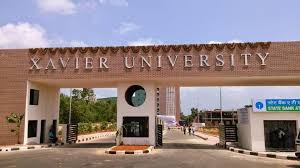"Compassion and social communication: Caring for our common home"

LAUDATO SI GLOBAL SCHOLARSHIP PROGRAM FOR YOUNG MEDIA PROFESSIONALS "Compassion and social communication: Caring for our common home"
Organizers The certified course is developed and delivered by
3) The Course will be informed by an interdisciplinary Center for the Study of New Humanities and Compassion.
interfaith orientations. (XCHCS) *, Xavier Bhubaneswar University (XUB), India for
4) The course will be covered in 3 interconnected modules. SIGNIS, the World Catholic Association for Communication. XCHCS will work closely with the Xavier School of Communication, the Xavier School of Sustainability and
5) The course will last for 3 months covering orientation and practical aspects.
other competent authorities with experience in the field of social teaching of the Church and the arts of communication. XUB will offer a three (3) month intensive course on campus, while SIGNIS will provide online, one month of preparation, and one month of follow-up in the applicant's (applicant's) home country, making it a five (5) month program. (* Formerly known as Xavier Center for Humanities and Compassion Studies).
General objective 1) To make young people aware of critical challenges.
face our Common Home (Mother Earth) today and shape communicative action strategies that nurture the Common Home for all 2) Prepare young social communicators and not just technicians. Fellows will work within the universal concerns of the Social Teachings of the Church, focusing on the meanings, messages and proposed strategies of action of the encyclical Laudato Si.
Critical characteristics of the course 1) The course is aimed at creating an audience and culture around Laudato Si over time and between religions. 2) The course will attempt to involve modern
awareness (through a process of awareness)
MONTH January 2020 February 2020 March 2020
6) The course will have critical readings / views, depth
April 2020 discussions, reflective / contemplative exchanges, field experiences and practical communication.
May 2020 activities / productions. 7) The chosen scholars of the Course must go through pre and post-course exercises as preparatory and follow-up components of the 3-month main intensive course. (Note: the components of the exercises for the course before and after one month will be held at the partner's residence location. The 3-month intensive course will be held at Xavier University in Bhubaneswar, India).
Basic eligibility (a) SIGNIS members and partners (b) Minimum qualification:
(i) SIGNIS communication laboratory (VJ, artisans, Commlab) graduates (ii) One year of experience in the field of communication with any diploma, OR (iii) Two years of experience in the field of communication.
with high school certificate, OR (iv) Three years of experience in the field of communication (c) Age: 20 - 35 years (d) Must be familiar with the English language ( course instruction )
Basic structure of the course
MODULE Home preparatory component Location Module 1: Church Social Teaching (STC) and Laudato Si at XUB Module 2: Becoming a communicator: Theory and tools at XUB
Module 3: Communication project: Caring for our common home at XUB
Implementation of the project in the origin location
Critical Module Concerns (Note: Modules are organized to address these concerns in an integrated and interconnected manner.)
STC
Modules
Modern conscience Laudato Si Investigate / Interrogate Communication / Media
Audience / Creating audiences / Reaching audiences (or audiences)
Module 1 Church Social Teachings (STC) and Laudato Si
Unit
Brief Description 1 • Exploring the social and contemporary contemporary local and global.
ecological problems
• Exploring the current challenge of social and ecological collapse 2 • How STC theology has been created
• Understand the theology of civic / public engagement
• Explore some case studies, including liberation theology.
• Exploring public theology 3 • Understanding the papal response, encyclicals, and STC
• Information from some key documents, presenting Laudato Si 4 • Key STC themes and principles
• Exploration and Diversity 5 • A Social Sciences / Humanities Perspective of Catholic Society
STC-inspired movements and their impact on local and global societies
• Explore some case studies, including movements associated with liberation theology 6 • The foundation of compassion: the Judeo-Christian
tradition
• Interfaith exploration
• Exploring the compassionate basis of Laudato Si 7 • Critical examination of Laudato Si: structure and themes
• Concepts and narratives.
• Problems, analysis, solutions.
• Appreciation, criticism and public debate 8
• Being Catholic
• Be a global citizen
Note: There will be a constant commitment to Laudato Si
Module 2 Becoming a communicator: basics: theory and tools
Unit
Brief description 1 Basic concepts of
• What is communication? Communication
• Forms of communication / face to face and the communication process
Communication / Mass communication / Media
• Diffusion / Narrow diffusion / Social networks
• Basic theories and model of communication.
• Culture and communication.
• Technology and communication.
• Dominant and alternative development paradigm 2 Development
and letters from
• Approaches to development: social justice, empowerment, communication for development
Communication, Third World / Developing World / Global South, Globalization / Localization
• Communication actions to support development: social mobilization, grassroots participation, human rights / dignity movements, community empowerment, social movements
• Letters of communication from the towns and Laudato Si
• Communication orientations, including compassionate communication
• Awareness and ethics 3 Sustainability,
• Principles of sustainable design communication
• Sustainable communication design and design and aesthetics.
Laudato Si
• Reaching people and creating audiences
• Principles of communication aesthetics.
Communication and media
Political economy of communication / media
Sustainability and Communication / Media
Semiotics, Look, Meanings, Narratives, Aesthetics
ESTIMATED LEARNING HOURS 20 days / 2-3 hours per day 25 days / 4-5 hours per day 25 days / 4-5 hours per day (project planning will begin) 25 days / As required by the project (includes presentation and project evaluation) 20 days / 2-3 hours per day






